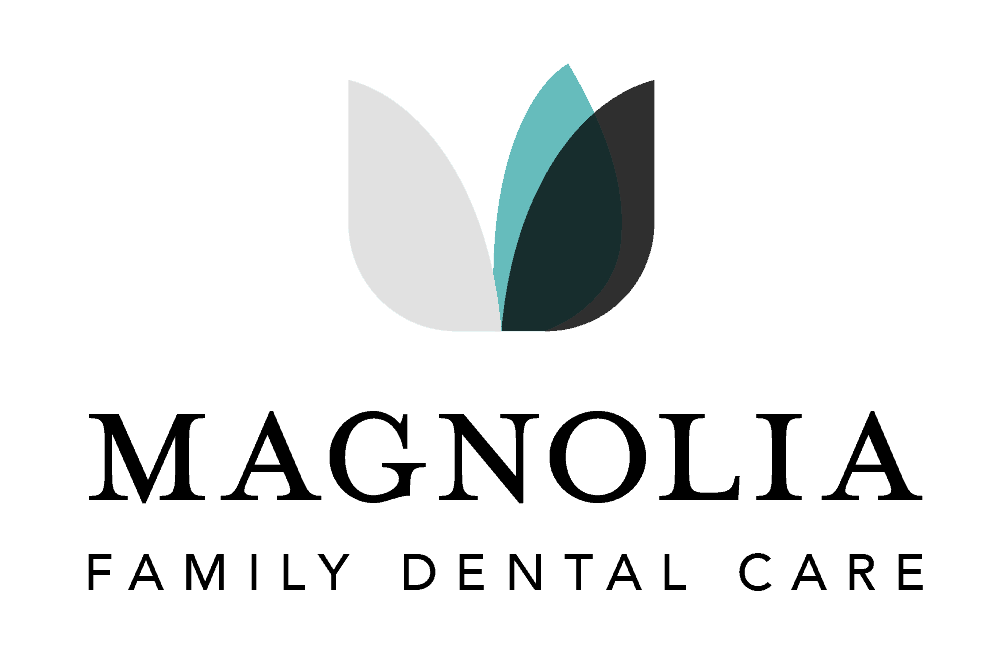
FAQs
At Magnolia Family Dental, we take all your concerns seriously. View our FAQs below to learn more information about us.
Why do dentists need to replace fillings?
Over the past 20 years there has been a debate between Amalgam (silver) fillings and tooth colored fillings. After extensive research it has been proven that both are very effective. After time they will wear out, fracture, or get new decay which occurs just like tires wearing out.
Why is it that my teeth are sensitive to cold but my dentist cannot see any decay?
This is usually due to root sensitivity. If the gums recede and the root is exposed, the endings which are found on the surface of the root will react to extreme temperatures. Most often the teeth will desensitize over time but the use of toothpastes such as Sensodyne will help eliminate the sensitivity more quickly.
Why do dentists want to save teeth as opposed to extracting them and making dentures?
When a person loses all of their teeth and have those replaced with dentures, they lose 80% of their ability to chew. With the use of dental implants it is easier to get a “better fit” which provides more stability for keeping the dentures in place, but the bottom line is don’t let it get to that point.
What does the overall health of the body have to do with the health of the mouth?
The mouth has often been referred to as a window into your overall health and can offer clues about different health conditions. Those that may be linked include heart disease, diabetes, stomach issues and stress. Other conditions that can be detected from an oral exam include oral cancer, Sjogren’s syndrome, chronic gum disease and viral/bacterial infections.
Why should I go to the dentist regularly?
Many people do not see a dentist on a regular basis. They only go when they have a problem. This is known as “crisis treatment” versus “preventive treatment.” While these patients may feel they are saving money, it often ends up costing much more in dollars and time. This is because many dental problems do not have symptoms until they reach the advanced stages of the disease process. An example is tooth decay. It is typical to hear, “Nothing hurts… I don’t have any problems.”
Tooth decay often does not hurt until it gets close to the nerve of the tooth. It is not uncommon to see a patient with a huge cavity who has never felt a thing. The dentist can usually detect a cavity 3-4 years before it develops any symptoms. This early detection can help you prevent root canal treatment.
Why should I floss, isn't brushing enough?
Flossing reduces the number of bacteria in your mouth. There are millions of these microscopic creatures feeding on food particles left on your teeth. These bacteria live in plaque which can be removed by flossing. Brushing your teeth gets rid of some of the bacteria in your mouth. Flossing gets rid of the bacteria the toothbrush can’t get to. That’s the bacteria hiding in the tiny spaces between your teeth. If you do not floss, you allow plaque to remain between your teeth. Eventually it hardens into tartar. Plaque can be removed by brushing. Only the dentist can remove tartar.
Ask your dentist to show you the proper way to floss. You will both notice the difference at the next cleaning appointment.
How can I get my kids to brush their teeth?
Make it fun! If you are enthusiastic about brushing your teeth, your children will also be enthusiastic. Children want to do the things their parents do. If your children see you brushing your teeth and displaying good dental habits, they will follow. Ask the dentist for other creative ways to get children to brush their teeth.
Getting your children to brush starts with taking them to the dentist at an early age. All children should be seen by their first birthday or 6 months after the eruption of the first tooth.
How can I prevent cavities?
Always spend two to three minutes brushing your teeth. It takes that long to get rid of the bacteria that destroy tooth enamel. Do not brush too hard. It takes very little pressure to remove bacteria and plaque. Floss at least once a day. Flossing is the only way to get bacteria from between your teeth.
Watch the sugar you eat. There is sugar in candy, fruits, crackers and chips. These are the foods that the bacteria in your mouth like best. Be mindful of foods like raisins and peanut butter that stick to your teeth. They can provide a constant supply for the bacteria eating into your teeth. Try to minimize the times during the day when sweet items are eaten and brush your teeth afterwards.
If you cannot brush after a meal, rinse your mouth with water – which can help to remove food from your teeth. Chewing sugarless gum after a meal can also help. Chewing deskulates the flow of your saliva which acts as a natural plaque-fighting substance. And do not forget your regular dental visits. Good dental habits will go a long way toward a no-cavity visit.
Book An Appointment Online Now
CONTACT MAGNOLIA FAMILY DENTAL CARE
Questions? Contact us today!
Contact information
6939 S 66th E Ave Tulsa, OK 74133
(918) 492-3771
magnoliafamilydentalcare@gmail.com
magnoliadentaltulsa.com
Our Hours
M
8AM-5PM
T
8AM-5PM
W
8AM-5PM
Th
8AM-5PM
F
Closed
S-S
Closed
